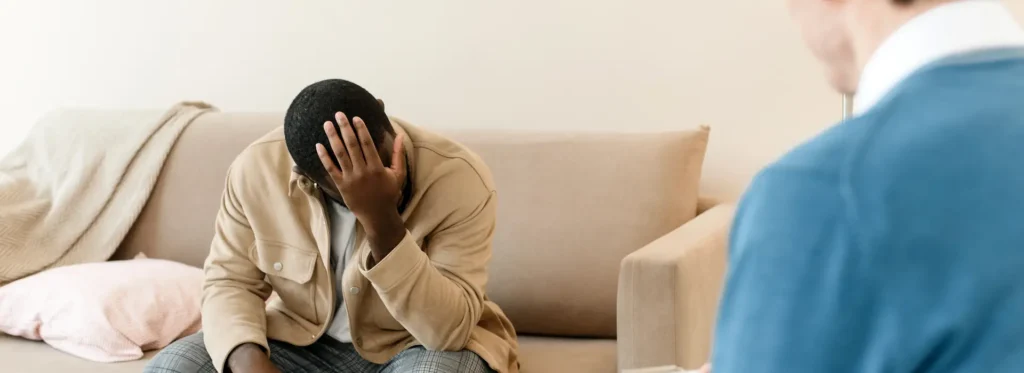Talk Therapy for Anxiety Disorder
Therapy for anxiety offers proven strategies to help manage fear, worry, and panic. With support from a qualified therapist, you can develop the skills to navigate stressful thoughts and situations with greater ease.
Whether you live with a diagnosed anxiety disorder or feel your symptoms are beginning to interfere with your life, therapy for anxiety can provide the clarity and structure needed to move forward. You don’t have to carry the weight of anxiety alone. With the right treatment and support, it is possible to regain control and improve your quality of life.
Understanding Anxiety Disorder and Its Impact
Anxiety is more than occasional worry. It is a mental health condition that can affect every aspect of daily living. From disrupted sleep and poor concentration to strained relationships and physical symptoms, the impact of anxiety is both wide-ranging and deeply personal.
Common Signs and Symptoms
Recognising the symptoms of anxiety is the first step toward addressing it. Signs of anxiety can include a racing heart, excessive sweating, trembling, or rapid breathing. You may also feel restless, irritable, or struggle to concentrate. Many people report difficulty sleeping and an overwhelming sense of dread.
These symptoms may arise without a clear trigger and can fluctuate in intensity. In some cases, they may cause you to avoid places, people, or situations for fear of an anxiety response.
Causes and Contributing Factors
Anxiety typically develops due to a combination of biological, psychological, and environmental factors. Stressful events, such as bereavement, exams, or job changes, can increase vulnerability. A family history of anxiety or mood disorders may also play a role.
Chemical imbalances in the brain, particularly those involving neurotransmitters like serotonin and dopamine, are linked to anxiety. Additionally, underlying health conditions such as thyroid issues or cardiac irregularities can mimic or exacerbate symptoms. Even certain thought patterns, like catastrophising or avoiding discomfort, can reinforce the cycle of anxiety over time.
Anxiety Disorders Overview
Anxiety presents in several different forms. The main types include:
- Generalised Anxiety Disorder (GAD): Persistent, excessive worry about everyday matters.
- Panic Disorder: Repeated panic attacks involving sudden, intense fear and physical symptoms.
- Social Anxiety Disorder: A fear of being judged or embarrassed in social settings.
- Phobias: Intense fear of a specific object or situation, such as flying or enclosed spaces.
Additional diagnoses include separation anxiety disorder, post-traumatic stress disorder (PTSD), and obsessive-compulsive disorder (OCD). Each anxiety disorder has distinct features but shares the potential to disrupt daily functioning and well-being.

Types of Therapy for Anxiety
Therapeutic approaches vary depending on the type of anxiety and individual needs. Below are some of the most effective evidence-based treatments.
Cognitive Behavioural Therapy (CBT)
Cognitive Behavioural Therapy (CBT) is widely considered the gold standard for treating anxiety disorders. CBT for anxiety focuses on identifying and challenging unhelpful thought patterns and behaviours.
During CBT sessions, your therapist may guide you through structured exercises to help you examine your beliefs, track anxiety triggers, and practise new coping strategies. CBT can also include goal-setting and self-monitoring tools such as thought diaries.
A typical course of CBT involves 8–20 therapy appointments, though this can vary. The method has robust evidence supporting its use for generalised anxiety disorder, panic disorder, and social anxiety disorder.
Exposure Therapy
Exposure therapy for anxiety, often delivered as part of CBT, gradually introduces individuals to the source of their anxiety in a safe and supportive setting. This approach aims to desensitise the fear response and help reduce anxiety over time.
You might begin by imagining the feared situation, followed by real-life exposure under therapeutic guidance. The process is highly structured and can be effective for treating phobias, PTSD, and panic attacks.
Acceptance and Commitment Therapy (ACT)
ACT teaches you to accept distressing thoughts rather than struggle against them. Instead of trying to eliminate anxiety, ACT helps you change how you respond to it.
Mindfulness and values-based action are central components of ACT. By learning to tolerate uncomfortable emotions and commit to meaningful goals, people often find a greater sense of purpose and less reactivity to anxiety triggers.
Choosing the Right Therapeutic Approach to Treat Anxiety Disorders
No single treatment works for everyone. The most effective therapy option for anxiety will depend on your symptoms, personal preferences, and treatment goals.
Personalised Treatment Plans
A personalised treatment plan involves tailoring therapy to your specific situation. Mental health professionals will consider factors such as your diagnosis, life history, and preferences when creating a treatment plan.
Many people with anxiety disorders benefit from CBT or a combination of approaches, such as CBT integrated with mindfulness or behavioural techniques.
Treatment plans may include homework exercises, stress management tools, and regular progress reviews. Working collaboratively with your therapist ensures the plan evolves with your needs.
Factors That Influence Therapy Choice
Several factors can guide your therapy choice:
- Type and severity of your anxiety symptoms
- Whether you prefer in-person therapy or online therapy
- Time and financial constraints
- Availability of evidence-based talking therapies in your area
- Referral from a GP
Some may prefer structured programmes, while others seek private options or digital platforms. Whichever route you take, what matters most is that your therapy service is effective and suited to your needs.

The Link Between Anxiety and Addictive Behaviours
Anxiety and addiction often go hand in hand. Many people turn to substances or compulsive behaviours in an attempt to self-soothe or escape the distress caused by anxiety symptoms. Alcohol, prescription drugs, gambling, or even excessive screen use may offer short-term relief but tend to worsen the anxiety over time.
Substance use and behavioural addictions can also mask the symptoms of an underlying anxiety disorder. In some cases, withdrawal from these substances triggers or intensifies anxiety symptoms, creating a cycle that is difficult to break without professional help. Effective treatment should address both conditions simultaneously through integrated care.
Find Support for Anxiety at PROMIS
Whether your anxiety led to addiction or the other way around, PROMIS offers a space where both issues can be addressed safely and respectfully. The team understands that recovery is a personal journey, and their treatment approach is designed to support long-term resilience, not just a temporary resolve.
Frequently Asked Questions
What are the most effective therapies for treating anxiety?
CBT is a leading treatment for anxiety. Other effective therapies include exposure therapy, ACT, and mindfulness-based approaches.
How does cognitive behavioural therapy help with anxiety?
CBT identifies and challenges negative thought patterns and behaviours. It equips individuals with practical skills to manage symptoms and reduce anxiety over time.
Can self-led therapy be a successful approach for anxiety management?
For people with mild anxiety, self-help tools like online therapy, apps, or workbooks may help manage symptoms. However, severe anxiety may require professional intervention.
What options are available for anxiety therapy online?
Many services now offer online therapy, including video and text-based sessions. This is especially helpful for people who prefer flexible formats or have mobility or scheduling challenges.
Which therapeutic approaches are recommended for both anxiety and depression?
CBT, ACT, and interpersonal therapy are commonly used for anxiety and depression. These approaches focus on changing thought patterns, improving relationships, and building coping strategies.
How can I find a reputable therapist for anxiety in my area?
Speak with your GP for a referral or visit trusted directories such as Anxiety UK. Look for therapists with experience in anxiety disorders and ensure they offer evidence-based approaches like CBT or ACT.
